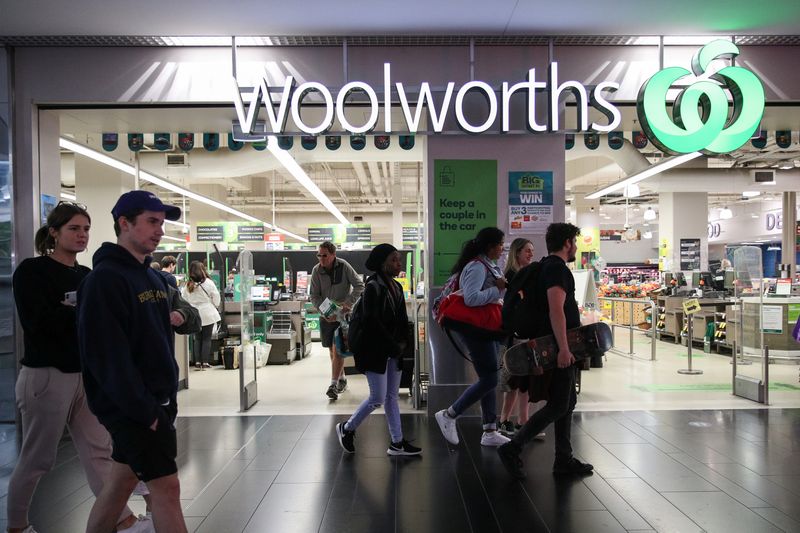Aussie grocers to benefit from higher prices, rising costs a worry
2022.08.23 13:46

People walk past a Woolworths supermarket following the easing of restrictions implemented to curb the spread of the coronavirus disease (COVID-19) in Sydney, Australia, June 16, 2020. Picture taken June 16, 2020. REUTERS/Loren Elliott
By Riya Sharma and Savyata Mishra
(Reuters) – Earnings of Australia’s two biggest supermarket chains may get a boost from sustained demand for groceries and other essentials, but their comments on costs will be in focus as everything from fuel to labour gets expensive.
As prices gallop to near three-decade highs, prompting the Reserve Bank of Australia to go on a rate-hike spree, supermarket chain operator Woolworths Group and smaller rival Coles have endured the heat by passing on higher costs to customers.
Consumers, on their part, are changing their spending habits to battle the effects of inflation by picking up produce off shelves instead of eating out more, prompting analysts to predict upbeat results for the chains for the financial year ended June 30.
“We expect consumer stocks to report solid FY22 results and provide strong trading updates given consumer demand has persisted,” Jefferies analysts wrote in a note.
While the current reporting period is too early to reflect any weakness, any commentary from Woolworths and Coles suggesting a change in buyers’ behaviour could sour investor mood, the analysts said.
Expenses will also be a major focus, though the companies, which together account for two-thirds of Australian grocery sales, have in the past said they would pass on rising energy and ingredient costs to price tags.
Investors would look out for their views on cost, especially on how they have managed COVID expenses and impact from floods, brokerage UBS said.
Solid Australian retail sales data from last quarter underscored that consumer spending remained robust even as inflation hit a 21-year high.
Still, cost of living pressures continue to pile as mortgages and credit products become more expensive, likely forcing customers to trade down to cheaper alternatives.
“Consumers may seek to look for alternative products from the likes of other independent stores like Aldi and IGA Supermarkets, where pricing is a lot more competitive for similar products,” CMC Markets analyst Azeem Sheriff said.
Sheriff sees the likelihood for this phenomenon as a risk to future share price. Coles reports full-year results on Wednesday and Woolworths on Thursday.
($1 = 1.4543 Australian dollars)








